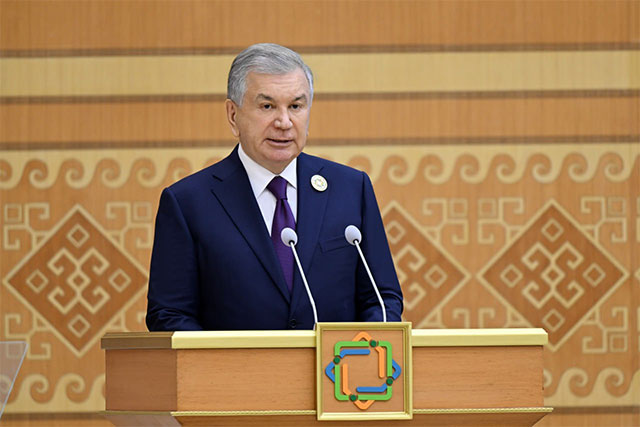
Shavkat Mirziyoyev Participates in Third UN Conference on Landlocked Developing Countries
Shavkat Mirziyoyev Participates in Third UN Conference on Landlocked Developing Countries
Tashkent, Uzbekistan (UzDaily.com) — On 5 August, President of the Republic of Uzbekistan Shavkat Mirziyoyev took part in the Third United Nations Conference on Landlocked Developing Countries, held in the Avaza National Tourist Zone in the city of Turkmenbashi.
The meeting, chaired by President of Turkmenistan Serdar Berdimuhamedov, brought together UN Secretary‑General António Guterres, the Presidents of Kazakhstan and Tajikistan Kassym‑Jomart Tokayev and Emomali Rahmon, as well as leaders of a number of other states, heads of government, and representatives of international and regional organizations.
The agenda focused on strengthening transport connectivity, simplifying trade procedures, supporting economic transformation, enhancing resilience to climate change and environmental challenges, and advancing the Sustainable Development Goals.
At the start of his address, the President of Uzbekistan praised Turkmenistan’s efforts to promote sustainable development, strengthen regional and global stability, and foster prosperity. He stressed that the issues under discussion are of critical importance for countries without access to seaports, since the need to cross several countries’ territories creates a range of objective challenges, including high tariffs, limited capacity of transport corridors and infrastructure, and dependence on the customs and transit policies of neighboring states.
According to the World Bank, Central Asia loses up to 2 percent of its GDP annually due to high transport costs and unstable transit. Logistics expenses account for as much as 60 percent of the value of goods — several times higher than the global average.
In this regard, the development of reliable transit routes and modern logistics infrastructure has become a key condition for the region’s sustainable progress. “The agenda that unites us today is directly linked to the issue of fairness,” the President of Uzbekistan emphasized. “Landlocked countries must be given equal opportunities to participate in the global economy.”
To address these challenges, the President highlighted three key priorities: modernization of infrastructure, strengthening connectivity to prevent transit disruptions, and ensuring the right to development as the foundation of global equality.
Shavkat Mirziyoyev noted that in recent years Uzbekistan has implemented large‑scale reforms: building a modern transport and logistics network with strong private sector participation, advancing digitalization in trade and transport processes, and improving the investment climate. These measures, he said, have enhanced the country’s competitiveness and accelerated the adoption of innovations.
“Strengthening trust and partnership in Central Asia has given a powerful impetus to these transformations,” he added. Today, the region is shaping a unified transport and logistics space, actively pursuing projects to turn Central Asia into a major transit hub between East and West, North and South. In recent years, mutual trade volumes have increased 4.5 times, exceeding $11 billion; investments have doubled; and the number of joint ventures has grown fivefold.
This year, construction began on the China–Kyrgyzstan–Uzbekistan railway, while freight traffic along the Uzbekistan–Turkmenistan–Iran–Turkey route has grown significantly.
The President of Uzbekistan presented a number of initiatives to address common challenges. Among them were speeding up the implementation of the Uzbekistan–Afghanistan–Pakistan railway project and integrating it with the China–Kyrgyzstan–Uzbekistan line. This, he noted, would pave the way for the creation of a new trade and economic space and a resilient transport network across the wider region.
He also proposed making fuller use of the Middle Corridor’s potential by ensuring a coordinated transit policy, unifying regulations, and setting optimal tariffs for container transport.
Special attention was given to the development, under UN auspices, of a Global Transit Guarantees Agreement for landlocked countries. This document would ensure fair access to ports and communications, reduce logistics risks, and help close global inequalities in this area.
In addition, the President suggested establishing a UN‑led Fund for Logistics Integration to finance large‑scale infrastructure projects. Central Asian countries alone need nearly $40 billion annually in transport infrastructure investment.
He further proposed creating a Global Vulnerability Index for landlocked countries to provide an objective assessment of their transit limitations and expand access to international financial and technical programs.
The President recalled the importance of creating an Innovation Hub for the agricultural sector in Uzbekistan, which would facilitate the introduction of advanced agrotechnologies, the development of water‑saving projects, food security initiatives, and knowledge sharing.
He also underscored the need to actively engage international experts and think tanks in discussions on tackling shared challenges, including through forums and round tables. Priority topics, he said, include integration into global value chains, the development of artificial intelligence and digital technologies, cross‑border investment, and support for startups.
President Mirziyoyev confirmed Uzbekistan’s readiness to join the activities of the International Think Tank for Landlocked Developing Countries and expressed confidence in the further strengthening of constructive, long‑term partnerships.
The conference concluded with the adoption of the Avaza Political Declaration.
#Shavkat Mirziyoyev